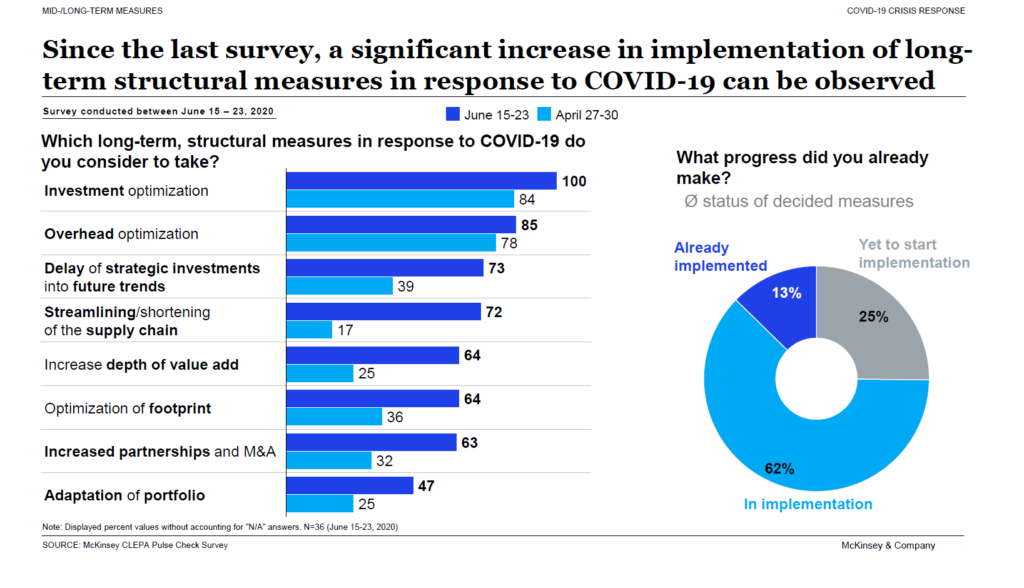NextGenerationEU: reality and ambition are bound to collide – Newsletter Editorial July 2020
EU leaders will gather next week for an additional EU Summit to try and come closer on the next 7-year EU budget and the additional special funds to be channelled into economic recovery. Dubbed NextGenerationEU, resilience seems to be the key concept behind much of the measures proposed, with the magic ingredient being investment.
It is crucial that governments agree soon, because most of the funds will become available only next year or later, and further delay would be detrimental. The crisis is hitting the economy hard, and viable companies are already incurring serious damage.
Resilience—making Europe more self-sufficient and future proof—is used as explanation for why the proposed recovery package has all the features of a fundamental restructuring programme, aimed at propelling the EU’s environmental and digital transformation.
Are we talking recovery or reform?
“Are we talking recovery or reform”, asked a diplomat the other day, admittedly rhetorically. Many in industry had quietly thought the same. While the visionary appeal of the approach may be apparent and no-one questions the overarching need for going digital and green, the challenge remains to make it all work on the ground, where economies are in disarray.
The risk is that recovery and crisis relief are losing relevance as objectives in their own right, with their own set of requirements and, particularly, their need for speed. How grave the situation is, can be illustrated well with the measure of global car sales which is predicted to remain 23% below last year in Europe and -17% globally: the equivalent of 14 million cars, which is more than the entire volume of new cars sold annually in European markets.
Risk is that recovery and crisis relief are losing relevance as objectives in their own right
These are unprecedented drops in sales and the underlying economic activity will take at least 2 to 3 years to recover. The latest CLEPA Pulse Check, taking the temperature of the European automotive supply industry specifically, shows that half of European suppliers expect revenue declines of more than 20% in 2020 and a further third reckon with a drop of more than 30%. Although profit estimates have slightly improved compared to April, only 39% of suppliers are confident in achieving a profit in 2020.
European suppliers are increasingly taking long-term measures, with 62% indicating their implementation of such measures has started and 13% saying they’re already completed. Cutting investment and headcount rank as number one and two, but suppliers are also increasingly looking at shortening supply chains, sourcing in, optimising the manufacturing footprint, and opting for partnerships, mergers and takeovers and adapting their product portfolios.
Heavy pressure on investment capacity does not bode well for ability to drive necessary transformation
The heavy pressure on investment capacity does not bode well for the ability to drive the necessary transformation, which industry had started full throttle before Covid hit. The revenues to finance these investments will have to materialise, and this is where reality and ambition are bound to collide. Industry needs the framework conditions to thrive and invest.
NextGenerationEU, the European Green Deal and the Digital Agenda are declared economic growth strategies, designed to invest public money as a lever for even larger sums of private investment. Because this is clear: the green and digital transformation needs industry to deliver them, and most of the funding will have to come from businesses. Careful management by both policy makers and business will be necessary to get it right.
The European Commission has firmly put the ball in the court of the member states. While the heads of state must still agree on the actual sums to be allocated, national capitals are already asked to hand in their national recovery plans by October, in order to start discussions on approval of the content soon. National packages, hence, will decide the level and scope of support for truly European industries, such as automotive.
Need for European approach on levels below the visionary as well
No doubt, the EU is a complex animal. Most funds come from national pockets, and many policy competences are still national. Yet, the Commission is the guardian of the EU project and has many instruments at its disposal, including soft policy such as guidance on and coordination of best practices, that can make a difference in putting the framework right, especially but not only in support of smaller and mid-sized countries.
The automotive industry is crucial for the economic fabric of Europe. The sector is vast, innovative, with long value chains and strong eco-systems; a textbook example of how European integration and the internal market have helped make the European economy more competitive and, yes, resilient. What is needed now, is leadership and clearer directions for ensuring a European approach on levels below the visionary as well.
Sigrid de Vries, CLEPA Secretary General
Attachments
In: CLEPA News




